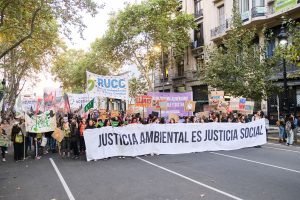Like every region of the world, Latin America has its own unique set of challenges and opportunities related to economic, environmental, and social issues.

An Earth Day march in Buenos Aires, Argentina. Photo credit: Shutterstock
Recognizing the interconnectedness of and the critical issues facing the countries that make up the Western Hemisphere, in July the 2022 Concordia Americas Summit brought together leaders from government, business, academia, and nonprofits who share a common objective to help, as University of Miami President Dr Julio Frenk framed it, ‘this hemisphere reach its full potential.’ Now in its sixth year, the ambition for the summit was to spark new solutions, investments and collaborations to address a multitude of issues, ranging from the ongoing impact of the pandemic and the mental health crisis to the emerging threats to democracy in the region and the critical need to transition to Net Zero.
Speakers, including H.E. Ivan Duque Márquez (now former President of Colombia who spoke on the heels of a historic election there), Dr Vivek Murthy (Surgeon General of the U.S.), H.E. Luis Amagro (Secretary General, Organization of American States), and the Honorable Diputada Ana Irene Delgado (Asamblea Nacional de Panamá), stressed the importance of engaging with Latin America and the need for enhanced public-private partnerships to not only tackle these intractable issues but to also unlock the potential of the region.
Donors can play a major role by increasing support throughout Latin America, especially for local NGOs
Most certainly, many issues discussed such as port security, free trade zones and the illicit drug trade will require enhanced regional cooperation and coordination, while others such as transitioning to Net Zero will require massive increases in infrastructure spending. National governments alone cannot meet the magnitude and urgency of this challenge, especially when designing inclusive, holistic, and resilient whole-of-society solutions. A key takeaway for me was the potential for the philanthropic community to play a catalytic role in helping to address many (but not all) of the challenges in Latin America and more broadly within the hemisphere.
Some issues such as education and workforce development, mental health, and supporting refugees align with giving strategies for private or corporate foundations and reflect the pressing needs in the region. For example, as noted during the summit by Hector Mujica, Head of Economic Opportunity with Google.org, by 2030, 90 per cent of the workforce globally will need digital skills to thrive (or survive) in a changing economic environment. Dr Murthy’s remarks that mental health and well-being are ‘the defining issues of our time’ underscores the critical importance of focusing on these issues throughout society. And one does not need to look far to see the multi-faceted causes and repercussions of the ongoing refugee crisis in Latin America. Issues of poverty, gender equity, conservation and many more also require urgent action.
Perhaps there has never been a more important time for the philanthropic community to engage with Latin America. Foundations have the potential to invest early in emerging or innovative approaches to address many of the above-mentioned issues. Private foundations can also help ‘de-risk’ solutions by providing the much-needed capital to incubate and then scale these solutions. Corporate foundations can align their giving with their business and brand strategies to help create the enabling conditions for economic development and growth in the region. This is far easier to say than to do. Undoubtedly, there are many success stories throughout Latin America of philanthropic investments that are delivering valuable resources, but navigating the cultural, legal and political environments for philanthropy in the 33 countries in Latin America and the Caribbean can make this work challenging.
From a giving standpoint, there have been some positive trends prior to the pandemic, as research shows funding from U.S. foundations had increased 36 per cent over a 10-year period. For grantmakers, a report from Indiana University’s Lilly School of Philanthropy and their joint report with WINGS and CEFIS UAI are good starting points to understand the current dynamics for giving. However, funding from US and European foundations is not the sole answer; Latin America needs a vibrant donor ecosystem that includes private and corporate foundations from the region. This will take time, as The Economist noted when writing during the height of the Covid-19 pandemic that ‘philanthropy is fragile in part because it is less deeply rooted than elsewhere, notably the United States and Europe.’ In my country of Colombia where philanthropy has a long-standing tradition of support for a number of issues such as education, social inclusion, and entrepreneurship, we still have a long way to go.
Philanthropy alone will not solve all of the challenges we face in the region, but donors can play a major role by increasing support throughout Latin America, especially for local NGOs, and by serving as a catalyst to spark increased partnerships and collaborations between the public and private sectors that are the key to creating the right conditions for long-term sustainable economic, environmental and social progress.
María Camila Guerra is Associate Vice President of Strategic Partnerships with Libra Group Social Responsibility.



Comments (0)